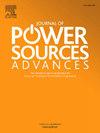China's hold on the lithium-ion battery supply chain: Prospects for competitive growth and sovereign control
IF 4.6
Q2 CHEMISTRY, PHYSICAL
引用次数: 0
Abstract
Battery production for electric vehicles (EVs) necessitates a supply chain capable of supporting the exploitation of a variety of raw materials. Lithium, nickel, manganese, and cobalt are of particular significance for the dominant lithium-ion battery (LIB) technology, primarily relying on lithium iron phosphate (LFP) and lithium nickel manganese cobalt oxide (NMC) cathodes. Geographically, the global supply is heavily reliant on China with competition expected to intensify. In light of this, the questions of how global competition manifests at the company level and whether regions capture their share of the supply chain through domestic companies remain unanswered. These are addressed by analyzing the companies behind each supply chain sector and the respective raw materials. The results demonstrate that China, Europe, and the United States of America (USA) exhibit the most pronounced ownership across the supply chain, acquiring the largest foreign shares in the mining sector. Overall, China leads in a total of eleven out of the 12 investigated sectors, with its peak for LFP production at above 98 %. This preeminence, coupled with the substantial output of South Korea, Europe, and Japan in NMC production, the latter represents a viable target for mitigating supply chain vulnerabilities and attaining greater growth and sovereignty.
中国对锂离子电池供应链的控制:竞争性增长和主权控制的前景
电动汽车的电池生产需要一个能够支持各种原材料开采的供应链。锂、镍、锰和钴对于主导的锂离子电池(LIB)技术具有特别重要的意义,主要依赖于磷酸铁锂(LFP)和锂镍锰钴氧化物(NMC)阴极。从地理上看,全球供应严重依赖中国,预计竞争将加剧。有鉴于此,全球竞争如何体现在公司层面,以及各地区是否通过国内公司在供应链中占据了自己的份额,这些问题仍未得到解答。通过分析每个供应链部门背后的公司和各自的原材料,可以解决这些问题。结果表明,中国、欧洲和美利坚合众国(USA)在整个供应链中表现出最明显的所有权,在采矿业中获得了最大的外国股份。总体而言,在12个被调查的行业中,中国在11个行业中处于领先地位,其LFP产量的峰值超过98%。这种优势,加上韩国、欧洲和日本在NMC生产方面的大量产出,后者代表了减轻供应链脆弱性、实现更大增长和主权的可行目标。
本文章由计算机程序翻译,如有差异,请以英文原文为准。
求助全文
约1分钟内获得全文
求助全文

 求助内容:
求助内容: 应助结果提醒方式:
应助结果提醒方式:


